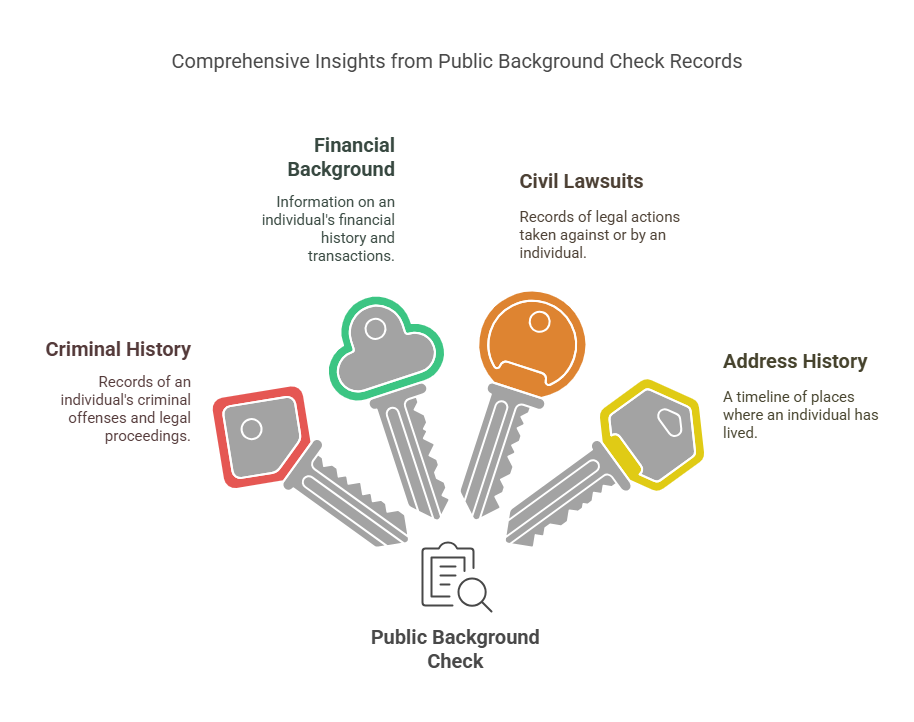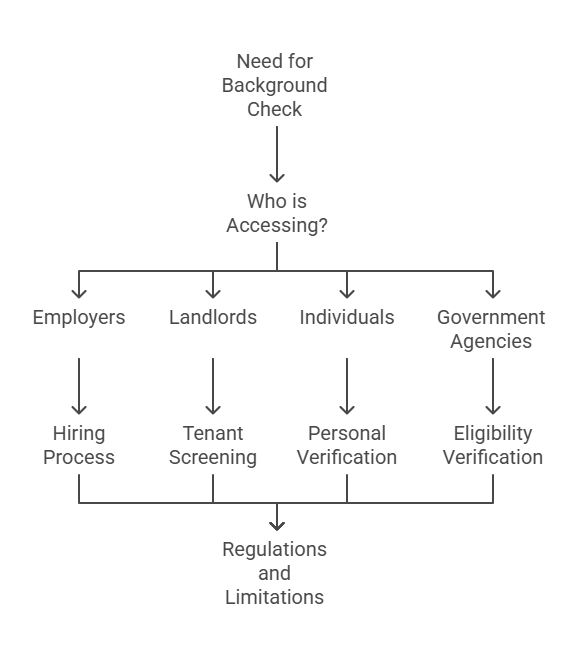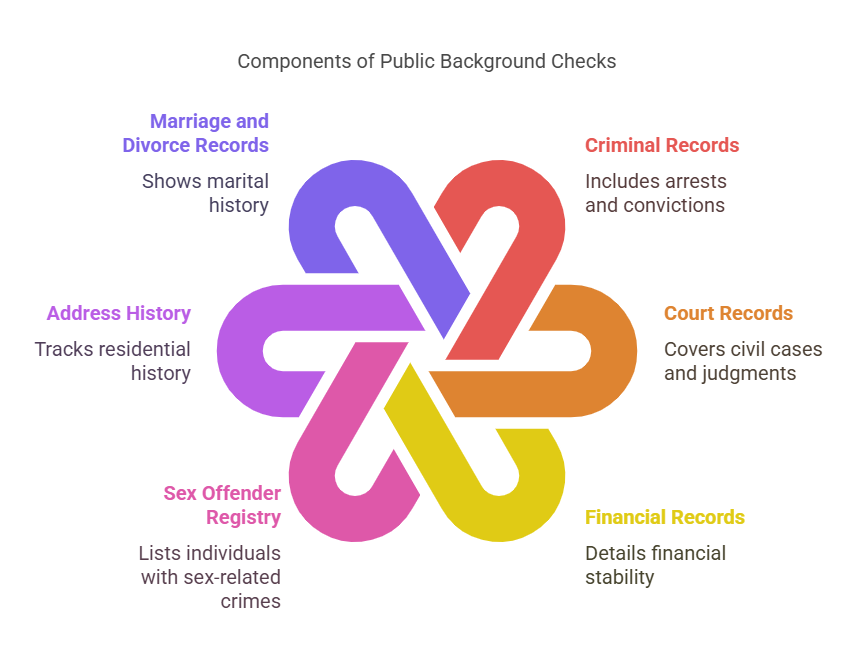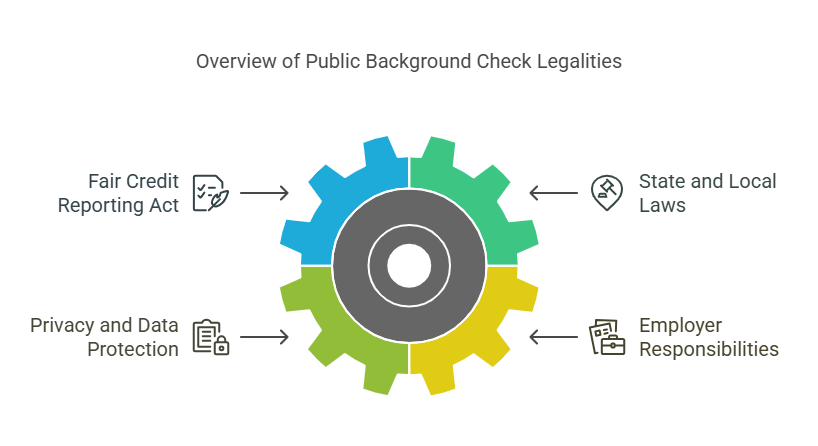What Is a Public Background Check? A Complete Guide

What Is a Public Background Check? A Complete Guide
Public background check have become an essential tool for individuals, businesses, and organizations to assess someone’s history before making important decisions. These checks provide insight into a person’s past and can help verify the accuracy of information, reveal any potential risks, and safeguard the interests of employers, landlords, and others who rely on them. Whether you’re hiring a new employee, renting out an apartment, or even checking someone’s background for personal reasons, understanding how public background checks work and what they reveal is crucial.
In this section, we will dive into what constitutes a public background check, the information that can be obtained, who can access these records, and why they are important. We will explore the intricacies of public records and highlight the significance of conducting such checks for employment, housing, and other personal decisions.
What is a Public Background Check?

A public background check is the process of reviewing publicly available records to assess an individual’s history. Public records are documents that are created by government entities or public offices and are accessible to the public. These checks typically involve gathering information about a person’s criminal history, financial background, civil lawsuits, and other relevant details that can give insight into their past actions and behaviors.
Public background checks may vary depending on the scope of the check and the resources available. For example, some checks may focus solely on criminal history, while others may include a wide array of public records like address history, civil court records, bankruptcy filings, and more.
Who Can Access Public Background Checks?

Public background checks are typically available to anyone who has a legitimate reason for conducting them. However, there are certain regulations and limitations in place to ensure privacy and prevent misuse. Here are some of the parties who commonly access public background checks:
- Employers: Employers often use public background checks as part of their hiring process. They may look into criminal history, employment history, and educational background to make informed hiring decisions.
- Landlords: Landlords frequently use background checks to screen potential tenants. These checks help ensure that the applicant does not have a history of criminal behavior or financial instability, which could pose a risk to the rental property.
- Individuals: Individuals may also conduct public background checks on themselves or others. For example, you might want to check your own record before applying for a job or verify someone’s background before entering into a personal relationship or business agreement.
- Government Agencies: Government bodies may conduct background checks to verify the eligibility of candidates for specific programs or positions, such as government contracts or licenses.
While public records are generally accessible, there are laws and regulations that govern how and when they can be accessed, especially regarding sensitive information like criminal records or financial data.
Types of Information Available in a Public Background Check
The information available in a public background check can vary based on the type of records being searched and the nature of the check. Here are some common types of public records that may be included:
- Criminal Records: These records provide information about any criminal charges, convictions, or arrests an individual may have had. Criminal history is one of the most common components of a public background check, especially in employment screening.
- Court Records: Court records can include civil cases, lawsuits, and judgments. These records may reveal whether an individual has been involved in legal disputes or has a history of financial or personal issues that could impact their reliability.
- Address History: An address history helps track where an individual has lived over time. This information may be used for verifying the identity or assessing the stability of a person’s lifestyle.
- Bankruptcy and Financial Records: Bankruptcy filings, liens, judgments, and other financial records are often accessible in public background checks. These records help evaluate a person’s financial responsibility and can be crucial when evaluating applicants for jobs or housing.
- Sex Offender Registry: Many public background checks include information from sex offender registries, which list individuals convicted of sex crimes. This is especially important for positions that involve working with vulnerable populations such as children or the elderly.
- Marriage and Divorce Records: Public background checks may also reveal information related to an individual’s marital status, including divorce filings and marriage certificates. While not always a central factor in employment or housing checks, it may be considered in specific contexts.
- Professional Licenses: For positions requiring specific licenses (e.g., medical, legal, or financial services), background checks can confirm whether an individual holds the necessary professional licenses and whether those licenses are in good standing.
Importance of Public Background Checks
Public background checks are important for a variety of reasons and serve several functions. The key importance of these checks lies in the ability to verify an individual’s history and ensure that they meet certain standards. Here are a few reasons why public background checks are vital:
- Risk Mitigation: For employers and landlords, a public background check helps mitigate the risk of hiring individuals who may pose a threat to the safety, security, or financial stability of the business or property. For example, a criminal background check can prevent the hiring of someone with a history of violent offenses.
- Informed Decision-Making: Public background checks allow employers, landlords, and individuals to make informed decisions based on factual data. They offer a way to verify claims made by applicants, ensuring that there is no misleading or fraudulent information.
- Protecting the Community: By reviewing criminal history and court records, public background checks help protect the broader community by ensuring that individuals with certain convictions or patterns of behavior are properly screened before being granted opportunities to work or rent.
- Compliance and Legal Safeguards: Employers and landlords must comply with various legal requirements when making hiring and rental decisions. Public background checks ensure that these decisions are based on factual and legal information, avoiding potential legal liabilities.
- Personal Safety: Individuals may choose to conduct public background checks to ensure their own safety when entering into business transactions, relationships, or partnerships. For example, someone may want to verify a potential business partner’s financial standing or criminal history before proceeding with a deal.
How Do Public Background Checks Work?
Public background checks involve searching various public records to gather information about an individual’s history. While the information gathered can be extensive, it’s important to note that the process of obtaining these records follows specific steps. Here’s how a typical public background check works:
- Consent: Before a background check can be conducted, consent from the individual is typically required, especially if the check is being used for employment or tenancy purposes. In many cases, consent must be documented, especially when the check is part of an official process like hiring or renting.
- Searching Public Records: The next step is searching the various public records that are available for inspection. These records can be accessed through government databases, court records, and other public repositories. Public records may be maintained at local, state, or federal levels, depending on the type of record.
- Verification of Information: The data retrieved during a public background check must be verified for accuracy. While many public records are considered reliable, discrepancies and outdated information may occur. For instance, criminal records may not always reflect expungements or pardons, and financial records may not include recent settlements or debts.
- Report Compilation: After gathering and verifying the information, a report is compiled. This report summarizes the findings and is presented in a format that’s easy to understand. It may include detailed breakdowns of criminal histories, court cases, financial records, address history, and more.
- Interpretation and Decision-Making: Finally, the information from the background check is reviewed by the party requesting it, such as an employer, landlord, or an individual conducting a personal search. Based on the findings, decisions can be made about whether to proceed with hiring, renting, or other actions.
Public background checks are primarily focused on using publicly available information, and the extent of the check depends on the nature of the inquiry. While anyone can technically conduct a public background check, the process may vary depending on the tools and resources available.
The Role of Public Records

Public records are the cornerstone of background checks. These records are produced and stored by government entities and are legally accessible to the public. Here are the primary types of public records that can be accessed during a public background check:
- Criminal Records: Criminal records include information about an individual’s arrests, convictions, sentences, and sometimes pending criminal charges. Criminal checks can reveal a wide range of offenses, from misdemeanors to serious felonies.
- Court Records: Court records encompass civil cases, lawsuits, judgments, and divorces. These records are important as they may highlight personal or financial issues that could impact an individual’s ability to perform in a given role or manage responsibilities.
- Financial Records: Public background checks may also include financial records such as bankruptcies, liens, and judgments. These records are valuable in determining a person’s financial stability and trustworthiness, which is particularly important for landlords and employers.
- Sex Offender Registry: The sex offender registry is a public database that includes individuals convicted of sex-related crimes. Many employers, landlords, and others will check this database to ensure they are not engaging with individuals who may pose a risk.
- Address History: Address records provide a history of where an individual has lived. This can help confirm identity and stability, especially in cases where an applicant claims to have lived at a specific address.
- Marriage and Divorce Records: Public background checks may include records related to an individual’s marital history, including marriages and divorces. These are not always relevant for every background check but may provide insight into an individual’s personal history.
Can Anyone Conduct a Public Background Check?
The short answer is yes—many individuals and organizations can conduct public background checks, but there are rules and limitations governing their use. In most cases, anyone can access public records, but the context and intent behind the search will determine whether certain information is accessible. Here’s a closer look at who can conduct a public background check:
- Employers: Employers can conduct public background checks as part of the hiring process. However, they must comply with the Fair Credit Reporting Act (FCRA), which mandates that consent must be obtained from the individual being checked. Employers also need to provide a notice of adverse action if the background check results in a decision not to hire.
- Landlords: Landlords frequently conduct background checks on prospective tenants. These checks help ensure the tenant has no history of criminal activity, evictions, or financial instability that could affect their ability to pay rent or maintain the property.
- Individuals: Individuals can also conduct their own background checks for various reasons. People may wish to check their own records before applying for a job, or they might want to verify the background of someone they are considering entering into a business deal or personal relationship with.
- Third-Party Services: Many people turn to professional background check services to assist in the process of gathering public records. These services streamline the process and ensure that the records retrieved are accurate, up-to-date, and legally compliant. These third-party services are particularly useful for employers and landlords who need to conduct comprehensive background checks on multiple individuals.
Precise Hire and Public Background Checks
Precise Hire is a professional service that specializes in conducting thorough public background checks. These services are particularly beneficial for employers and landlords who require accurate and up-to-date information to make informed decisions. Here’s how Precise Hire can help in the process:
- Compliance with Legal Requirements: Precise Hire ensures that all public background checks are conducted in full compliance with relevant laws, such as the FCRA and other state or local regulations. This means that employers and landlords can avoid legal issues by using a compliant service.
- Access to Comprehensive Records: Precise Hire provides access to a wide range of public records, including criminal history, court cases, financial records, and sex offender registries. Their service helps streamline the search process and delivers accurate results faster.
- Accurate and Up-to-Date Information: One of the biggest challenges in conducting public background checks is ensuring the information is accurate and up-to-date. Precise Hire uses reliable data sources and verification processes to ensure that the information provided is current.
- Efficiency and Time Savings: Using a professional service like Precise Hire saves time compared to doing manual checks. The service streamlines the process by consolidating information from various public records and presenting it in an easy-to-read report.
- Customization for Employers and Landlords: Precise Hire offers customizable background check services that cater to the unique needs of employers and landlords. This includes the ability to tailor the checks to focus on specific areas, such as criminal history, employment verification, or financial background.
Challenges in Conducting Public Background Checks
While public background checks are invaluable, they do come with some challenges that can affect their accuracy and efficiency. Here are a few common obstacles:
- Outdated Information: Public records can be outdated, especially if they have not been updated or purged from databases. This can lead to discrepancies in a person’s background check, which could negatively affect decision-making.
- Data Accuracy: Not all public records are accurate, and errors in these records can lead to incorrect conclusions. For example, a criminal record might not reflect recent expungements, or bankruptcy records may not include settlements that have been paid off.
- Time-Consuming: Gathering and verifying public records can be time-consuming, especially when dealing with large amounts of data from various sources. This is where professional services like Precise Hire come in handy by offering faster, more efficient solutions.
Benefits of Using Professional Services for Public Background Checks
The main advantage of using professional services for conducting public background checks is the assurance of accuracy, compliance, and efficiency. Here are some benefits:
- Reliability: Professional services ensure that the records are accurate and up-to-date, reducing the risk of making decisions based on faulty data.
- Legality: Professionals are well-versed in the legal requirements surrounding background checks, ensuring compliance with privacy laws and regulations.
- Streamlined Process: Third-party services save time by handling the complexities of background checks, allowing employers and landlords to focus on other aspects of their operations.
Legal Aspects of Public Background Checks

Public background checks must be conducted in compliance with legal frameworks designed to protect individuals’ privacy and ensure fair treatment. Employers, landlords, and other entities accessing public records must adhere to these guidelines to avoid potential legal repercussions. Below is an overview of key legal aspects associated with public background checks:
1. The Fair Credit Reporting Act (FCRA)
The FCRA is a federal law that regulates how background checks are conducted and how the information obtained can be used. Here are its primary requirements:
- Consent: Employers or landlords must obtain written consent from the individual before conducting a public background check.
- Disclosure: If the background check results in adverse action (e.g., not hiring a candidate), the individual must be informed and given a copy of the report.
- Accuracy: Background check information must be accurate, complete, and up-to-date.
- Adverse Action Process: Employers must follow a formal process when adverse actions are taken, including notifying the individual, providing the report, and allowing time for dispute.
2. State and Local Laws
Beyond federal laws, states and local jurisdictions may impose additional regulations on background checks. For instance:
- Some states have ban-the-box laws, which prohibit employers from inquiring about criminal history on job applications.
- Certain states limit how far back criminal background checks can go, often capping the period at 7 to 10 years.
- States like California have additional privacy protections, requiring heightened consent procedures and limiting the type of information employers can access.
3. Privacy and Data Protection
While public records are legally accessible, privacy laws still apply. Key considerations include:
- Restricted Information: Certain types of personal data, such as medical history or protected classes (e.g., race, religion), are off-limits for most background checks.
- Sealed or Expunged Records: Criminal records that have been sealed or expunged are not legally available and should not appear in a public background check.
- Identity Verification: To prevent misuse, individuals requesting public records may be required to verify their identity and justify their purpose.
4. Employer Responsibilities
Employers have a legal obligation to ensure fairness and transparency during the hiring process. This includes:
- Avoiding discriminatory practices when interpreting background check results.
- Providing applicants with the opportunity to explain discrepancies or inaccuracies.
- Ensuring background checks are relevant to the job role (e.g., financial checks for accounting positions).
How to Stay Compliant with Public Background Check Regulations
Compliance with background check regulations is essential to avoid legal risks. Here are some best practices to ensure compliance:
- Obtain Written Consent: Always secure documented consent from the individual before conducting a background check.
- Partner with Reliable Services: Work with reputable background check providers like Precise Hire to ensure compliance with FCRA and state laws.
- Focus on Relevance: Limit the scope of the background check to information directly relevant to the decision-making process.
- Handle Data Securely: Protect the confidentiality of the data collected during the check, ensuring it is not shared unnecessarily.
- Follow Adverse Action Procedures: If the results lead to a negative decision, provide the individual with a copy of the report and allow them time to respond or dispute inaccuracies.
Frequently Asked Questions (FAQs)
What Information is Included in a Public Background Check?
A public background check typically includes data from public records, such as:
- Criminal history (arrests, convictions, pending charges)
- Court records (civil and criminal cases)
- Financial records (bankruptcies, liens, judgments)
- Address history
- Employment and education records (when publicly available)
Can a Public Background Check Be Used for Employment Purposes?
Yes, but employers must follow strict guidelines, including obtaining consent and adhering to FCRA requirements. Employers should also ensure the information is directly relevant to the job.
How Far Back Do Public Background Checks Go?
The timeframe for background checks depends on the type of record and jurisdiction:
- Criminal records: Typically 7-10 years, depending on state laws.
- Financial records: Bankruptcies may appear for up to 10 years, while other financial judgments vary.
- Civil cases: The duration varies but may align with the statute of limitations.
Can a Public Background Check Show Financial or Credit History?
Yes, public background checks may include financial data such as bankruptcies, liens, and judgments. However, full credit reports typically require additional authorization and are governed by the FCRA.
Are There Any Limitations on Who Can Conduct a Public Background Check?
While public records are accessible, not everyone can conduct a background check for any purpose. Employers, landlords, and other entities must have a legitimate reason and follow legal protocols. Individuals conducting personal checks should also ensure they are not violating privacy laws.
What Information is Included in a Public Background Check?
A public background check typically includes data from public records, such as:
- Criminal history (arrests, convictions, pending charges)
- Court records (civil and criminal cases)
- Financial records (bankruptcies, liens, judgments)
- Address history
- Employment and education records (when publicly available)
Can a Public Background Check Be Used for Employment Purposes?
Yes, but employers must follow strict guidelines, including obtaining consent and adhering to FCRA requirements. Employers should also ensure the information is directly relevant to the job.
How Far Back Do Public Background Checks Go?
The timeframe for background checks depends on the type of record and jurisdiction:
- Criminal records: Typically 7-10 years, depending on state laws.
- Financial records: Bankruptcies may appear for up to 10 years, while other financial judgments vary.
- Civil cases: The duration varies but may align with the statute of limitations.
Can a Public Background Check Show Financial or Credit History?
Yes, public background checks may include financial data such as bankruptcies, liens, and judgments. However, full credit reports typically require additional authorization and are governed by the FCRA.
Are There Any Limitations on Who Can Conduct a Public Background Check?
While public records are accessible, not everyone can conduct a background check for any purpose. Employers, landlords, and other entities must have a legitimate reason and follow legal protocols. Individuals conducting personal checks should also ensure they are not violating privacy laws.
Key Takeaways About Public Background Checks
- Accessibility: Public background checks provide valuable insights by leveraging information from public records, including criminal history, financial records, and court cases.
- Legal Compliance: Employers, landlords, and individuals must adhere to laws like the FCRA to ensure the process is fair, accurate, and transparent.
- Use Cases: Public background checks are widely used in hiring, tenancy, and personal decision-making, offering critical data to inform these processes.
- Professional Services: Third-party providers like Precise Hire can simplify the process, ensuring compliance and delivering accurate, up-to-date information.
- Best Practices: To stay compliant, always secure consent, verify data accuracy, and limit the scope of the check to relevant information.
Conclusion
Public background checks are a powerful tool for making informed decisions, whether you’re an employer hiring a new team member, a landlord screening tenants, or an individual ensuring safety in personal relationships. These checks provide access to critical public records, helping to reduce risks and ensure trustworthiness.
However, conducting public background checks comes with responsibilities. Adhering to legal requirements, respecting privacy, and ensuring the accuracy of the data are paramount. Professional services like Precise Hire can help navigate the complexities of public background checks, offering compliant, efficient, and reliable solutions.
